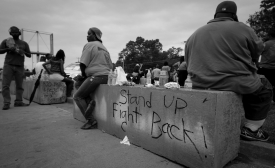united states
US Secretary of State John Kerry and Defence Secretary Chuck Hagel, pressed a core coalition of 10 nations at a NATO summit in Wales on Friday to go after the Islamic State (IS) in Iraq and Syria militarily and financially. "There is no time to waste in building a broad international coalition to degrade and, ultimately, to destroy the threat posed by the Islamic State," Kerry and Hagel said in a joint statement.
The seminar, to be held on Monday, is organised by the Spanish Permanent Mission to the United Nations together with Casa África, Spain’s main public diplomacy institution dedicated to the African continent, and Real Instituto Elcano, one of the most prestigious think-tanks. It will be attended ambassadors accredited to the UN and business executives from the United States and Spain.
As a shy, nervous 22-year-old NBA rookie, Yao Ming confronted the concentrated power of Shaquille O’Neal for the first time — and came out a winner. The metaphors are perhaps too easy: basketball’s gentle giant aiming to save Africa’s gentle giants; the man who built a bridge between China and the United States now trying to bridge another vast cultural divide, between his nation’s nouveau riche and the people and animals of Africa.
A hundred years later, dance is being used as a bridge over the century-old abyss between Turks and Armenians. DanceMotion USA, a cultural diplomacy initiative sponsored by the U.S. State Department’s Bureau of Educational and Cultural Affairs and produced by BAM, facilitated a contemporary dance collaboration among artists from the three nations.
References to development (even to the word “development”) do not appear in most of the reports on the recently concluded U.S.-Africa Leaders Summit. In this regard, I want to distinguish between “assistance” and “development,” between discrete projects on the one hand, and, on the other, the larger, more complex process of transforming economies, polities, administrations, and societies.
Secretary of State John Kerry warned Wednesday against creeping American isolationism, making the case that U.S. global leadership is essential in uncertain times as he hosted a rare public reunion of five of his predecessors. Speaking at the groundbreaking of a new museum celebrating the achievements of American diplomacy, Kerry said the United States looks inward at its peril and that U.S. engagement is needed more than ever.
Dr. Carol Atkinson, professor of international relations at USC and a veteran of the United States Air Force, gave an hour-long briefing to USC students at the Annenberg School for Communication and Journalism about U.S. military tactics on Wednesday afternoon. Atkinson, who served in Operation Desert Storm, spoke on the shift of the U.S. military’s approach from hard tactics to soft, due to what she described as a changing tide of foreign policy and a new era in public diplomacy.

Seib weighs in on "the U.S. Image Problem."







